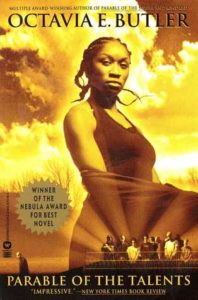I finished reading Parable of the Talents a few days ago. I was so motivated to read it because I kept finding parallels between Sower and the current state of the country, and I was desperate to understand how Lauren’s journey was concluded. Butler said in an interview that Talents was meant to be “a book of solutions,” (or something similar, I don’t have the book in front of me to check). So those “solutions” that I think Butler was talking about are, in part, fairly self-evident, but there’s definitely so much more that I would love to discuss with anyone else who has read the book or will in the future. Beth wasn’t kidding when she said reading Talents is tough, though. There were so many points where I wanted to put the book down and never touch it again because of all the violence and all the allusions that drove home how the world in the book isn’t so far departed from what has happened in the past and what can happen again in the future. I’m glad I made it through the book, though, despite how uncomfortable it made me the majority of the time. I didn’t find all of the solutions I was looking for, but it’s been a source of enlightenment in some areas and a it has served as a warning in other ways. Having read Sower, I’m sure you know what I mean by the latter. Continue reading “(Spoiler Free!) Thoughts on Parable of the Talents”
Biblical Parables and the Talents

The Biblical Parable of the Sower, in as brief an account as I can manage, follows a man who sowed seed into three different kinds of land with mixed success. The Parable of the Talents is about a man who went away and left his home and land in the care of his slaves. The titles of the novel we just read and its sequel are taken directly from their biblical parallels, and this has got me to thinking a lot about how religions build upon each other. I think it might be some kind of sacrilege for me to make this observation for some faiths, so I’m going to proceed with that in mind.
Continue reading “Biblical Parables and the Talents”
The Consequences of Resentment
I’ve been considering the origins and effects of resentment for the past two weeks or so since it first came up in class regarding exclusive studying spaces on campus and hypothetical exclusive shelter privileges (when we went outside and imagined all the buildings were locked). I knew I wanted to write a blog post about it, so I went to Google to try to find some material to work with. What I came across is this article here, which pins a bunch of negative consequences as being rooted in feelings of resentment. Continue reading “The Consequences of Resentment”
Looking Ahead
We have two weeks and just three classes left in this course before we conclude the semester. Our discussions have been as numerous and varied as our reading list (from Shakespeare to Lewis to Morrison to Butler, with everything else in between). One of our central goals is to figure out how we can connect our texts to our course objectives, and furthermore, how we can apply these connections to our lives outside the course. This is a pretty universal course outcome, and pretty vague in the way I phrased it, too. What I want to focus on is what will stay with me from this course once it’s over. We talked early on in the course about why it took us until now to consider the housing crisis, to look into its causes, and to be curious about our economy. For me, I wanted to believe that the answer to this question was quick and simple: laziness. But it’s not just laziness. I think my lack of willingness to look in to the housing crisis, as well as to the more general umbrella of “bad news” and negative current events (whether they seem to directly impact me or not) is something a little more sinister. Continue reading “Looking Ahead”
Housing Loss: The Grief & Other Losses
I’ve been considering how it affects a person to lose their home as a result of foreclosure, extreme weather, or otherwise. In my dirge essay, I touched on how Lear and Leah were impacted by losing their homes in King Lear and The Turner House. Fortunately for me, I have no personal experience with losing my home, so this post will be pulling mainly from the readings. Continue reading “Housing Loss: The Grief & Other Losses”
Wages & Real Estate
I made a few calculations after we watched part of Mr. Blandings Builds His Dream House on Friday. I was suspicious while we were watching this because there were a few factors that lead us to believe that Mr. Blandings and his family were getting badly ripped off, but the numbers didn’t seem to add up (literally). So we haven’t yet seen the remainder of the movie, and I haven’t attempted to look ahead because I want to make some predictions for the movie, or else point out some inconsistencies in case I’m wrong.
Here are some numbers to consider, with today’s equivalent in parentheses: Continue reading “Wages & Real Estate”
The Exclusivity of Language
Google defines “doublespeak” as “deliberately euphemistic, ambiguous, or obscure language.” I want to open up with this term because I am well-aware that there is some language used in the real estate business that is not only inaccessible to the people the realty agents sell to, but some of it is very deliberately misleading. There is plenty of discipline-specific terminology used in many varying fields, but not every field has any built-in need to deceive people. Continue reading “The Exclusivity of Language”
King Lear & the Housing Crisis
Hey everyone,
I’m trying to draw some connections between King Lear and the course themes we’ve been talking about. Since reading Act III, I feel a little less lost and confused than I did about how Shakespeare would fit into all of this than I did a week and a half ago. I think there’s much to be said for King Lear, a man who is supposedly in a position of relative authority, and his relationship and interaction with nature. So great is King Lear’s faith in his own status that he underestimates nature itself, and we can see this attitude reflected in his relationships with Goneril and Regan, whose power and authority he similarly underestimates. Like King Lear, people in positions of authority played off the destructive force of nature when Hurricane Katrina hit, underestimating it and/or playing off the damage it left in its wake.

